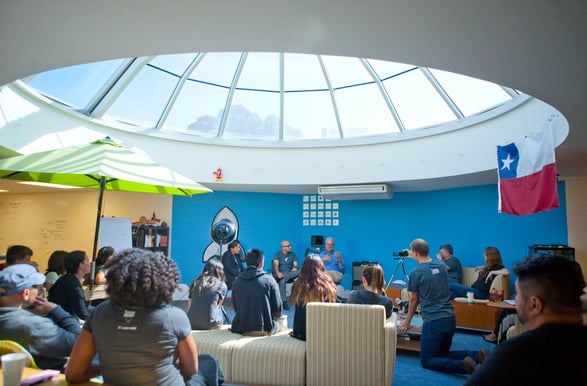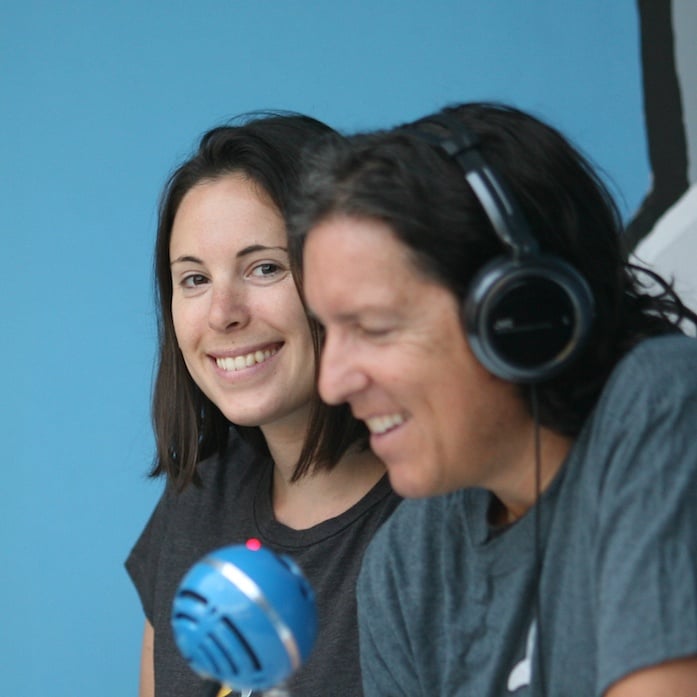Technology marketing expert Geoffrey Moore joins the show to discuss his new book, Zone to Win: Organizing to Compete in an Age of Disruption. Moore’s life’s work has focused on the market dynamics surrounding disruptive innovations. In this episode, Moore shares how established enterprises and startups can compete in an age of disruption.
Last August, Moore joined us for our Under the Dome Speaker Series, to talk about Crossing the Chasm and enterprise software adoption. One of the topics that relates very well to Helping Sells, is the concept of strategic acts of generosity. We wanted to talk to Geoffrey again about how strategic acts of generosity is a helping sells approach to technology adoption and then talk about his new book.
Click Below to Tweet This:
Here are some of the highlights.
Strategic Acts of Generosity
In the era of cloud and SaaS, marketing and sales have to create a relationship with customers. It's a courtship at the beginning, but then it's an ongoing relationship. No drive-by selling. Helping sells in the services-oriented consumption economy. You have to invest in the relationship. Show your belief in reciprocity by making the first move - not just in a casual way, but a thoughtful way like "we've been thinking about your situation, here's how we see intersection and how it might help you." It could also be a free trial or spending an hour to discuss new approaches to solving a problem. It is important to make that investment in the relationship in order to sustain a long-lasting relationship.
Here is that talk:
Give to Your Customers When it's Unexpected
It's powerful when you already have a lot of power to exercise strategic acts of generosity. If your customer is locked in, instead of abusing relationship, go over and beyond and give back and more. When a powerful company does that, it's even more impactful.
Leverage Playbooks to Win
We talk with Geoff about his new book, Zone to Win, which is about the innovator's dilemma. Mature technology companies have a big aging book of business that's profitable, but there's a disruption coming that requires a response. Large organizations know and prepare for it. They innovate, incubate, but when it comes to addressing issue they fail with remarkable consistency. Most companies try to negotiate this and can't. In Zone to Win Moore creates organization and expectation around it and shows how your company can use it to win.

Catching Waves: Be Better At Riding It Or Defending Against It
Case studies: Salesforce and Microsoft have both, in the last three to four years, dealt with this.
Salesforce introduced next-generation new wave. They took resources away from Sales Cloud and Service Cloud and spent resources on new businesses (Analytics Cloud an Marketing Cloud), which in short-term didn't perform in a stellar way but there was a big reward when market gives credit.
Microsoft had three businesses under direct attack (Windows under attack by mobile, Office by Google Apps, and back office software attacked by cloud). They had to keep next wave from catching them. They modernized their existing business and transformed existing business to modernize it to be part of new world. Either way it's inefficient and in short-term performance metrics look disappointing. That's why public companies have trouble with it - there's a low tolerance for J-curves.
Startups have an advantage over large corporations because investors want them to innovate, larger companies' investors don't.
The CEO has to say, "I know we don't normally do this, but this time we will, get on board."
This comes to a head during annual planning. All people with established lines of businesses talk about revenue and profit but someone says revenue returns won't be exciting in new lines, but traditional business people don't understand the special treatment. But it's because there's a new category but there's enormous resistance. Support orgs say, this new business is hard to support. We don't have processes. Customers don't understand. There's no ecosystem. We're all on our own. We shouldn't be doing this. For good reason, the organization goes into rejection mode, which is why many companies run at this hurdle and do not get over it.
Make it Clear That a New Transformational Initiative is Number One Priority in the Company
Change the compensation to reflect that so everyone in company has stake in new thing that takes priority over day job. If anyone in new initiative asks for help at any time, give it. That's why you can't do two of these at a time, and you shouldn't do more than one per decade. But if you did one, your company will be rewarded with high valuations.
Understanding the Four Zones: Transformation, Performance, Incubation and Productivity
Performance Zone
- Where the numbers are made.
- Everyone sells what you make or makes what you sell.
- Performance zone = if you have a bookings or revenue number in your comp plan. If not, you're not in this zone.
- In most times, performance zone rules the roost. Everyone else is in service to it.
Productivity Zone
- All the work behind the scenes to make performance zone successful.
- Customer service, marketing, IT, HR, procurement - enabling investments that make it possible.
- Both productivity and performance make clear ROI situation.
-
In the productivity zone, that's where companies run programs to help customers get on-boarded, achieve outcomes, get value out of software they've purchased.
Incubation zone
- Most companies have Incubation zone that does not give returns in near future.
- Fast failure, invest in speculative things.
- Get up to speed on next wave to get to know it better.
- Put futuristic people who are intuitive and into new things: agile development, fast-fail, tomorrow's technologies.
Transformation zone
- This is the "bite the bullet" to take something out of incubation zone and bring it to scale and make sacrifices to do so.
- Or someone has attacked from outside and take existing business under attack and bring it into transformation zone and modernize it as fast as possible and steal something from incubation zone.
- When it's activated, it's the number one priority.
- Transformation is on the executive staff agenda - it isn't a "building" like other zones.
- It stays a priority until lit's done.
Book takeaways
At the end of the interview we talked to Geoff about the one key takeaway he would like executives to takeaway from the book...well, you just need to listen to the show to find out his answer to that.
Let us know what you think of the show.
You could:
- Write a review on iTunes.
- Publish some tweets using the hashtag #HelpingSells
- Comment below.
Thanks for listening to the show.




